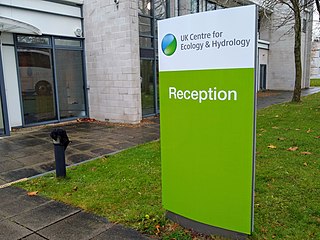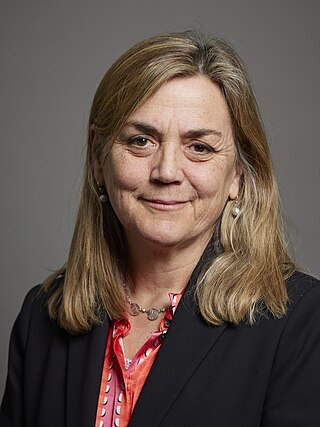Related Research Articles

The Department for International Development (DFID) was a ministerial department of the Government of the United Kingdom, from 1997 to 2020. It was responsible for administering foreign aid internationally.
The Engineering and Physical Sciences Research Council (EPSRC) is a British Research Council that provides government funding for grants to undertake research and postgraduate degrees in engineering and the physical sciences, mainly to universities in the United Kingdom. EPSRC research areas include mathematics, physics, chemistry, artificial intelligence and computer science, but exclude particle physics, nuclear physics, space science and astronomy. Since 2018 it has been part of UK Research and Innovation, which is funded through the Department for Business, Energy and Industrial Strategy.

The UK Centre for Ecology & Hydrology (UKCEH) is a centre for excellence in environmental science across water, land and air. The organisation has a long history of investigating, monitoring and modelling environmental change. It operates from four sites in the UK and one in Ghana. Research topics include: air pollution, biodiversity, chemical risks in the environment, extreme weather events, droughts, floods, greenhouse gas emissions, soil health, sustainable agriculture, sustainable ecosystems, water quality, and water resources management.

Research Councils UK, sometimes known as RCUK, was a non-departmental public body that coordinated science policy in the United Kingdom from 2002 to 2018. It was an umbrella organisation that coordinated the seven separate research councils that were responsible for funding and coordinating academic research for the arts, humanities, science and engineering. In 2018 Research Councils transitioned into UK Research and Innovation (UKRI).
The Economic and Social Research Council (ESRC), formerly the Social Science Research Council (SSRC), is part of UK Research and Innovation (UKRI). UKRI is a non-departmental public body (NDPB) funded by the UK government. ESRC provides funding and support for research and training in the social sciences. It is the UK's largest organisation for funding research on economic and social issues.

The Bodélé Depression, located at the southern edge of the Sahara Desert in north central Africa, is the lowest point in Chad. It is 500 km long, 150 km wide and around 160 m deep. Its bottom lies about 155 meters above sea level. The dry endorheic basin is a major source of fertile dust essential for the Amazon rainforest.
The Centre for Polar Observation & Modelling (CPOM) is a Natural Environment Research Council (NERC) Centre of Excellence that studies processes in the Earth's polar environments. CPOM conducts research on sea ice, land ice, and ice sheets using satellite observations and numerical models.
The School of Global Development is a department at the University of East Anglia, Norwich, England. Situated within the Faculty of Social Sciences, the School of International Development has been ranked in the top three British development studies departments.

Fennec is a large-scale, international, multi-institutional, multi-platform, observational, modelling and satellite climate program in the Saharan Heat Low region. The Saharan Heat Low is a key component of the West African Monsoon and is the location of the largest mineral aerosol loadings on the planet in the northern summer. The inhospitable, vast area of the Heat Low has virtually no routine meteorological observations. Knowledge of the key atmospheric processes in this important region is therefore very limited and this knowledge deficit results in reduced performance of both weather and climate prediction in and well beyond the north/west African region. The Fennec project is designed to address this knowledge deficit. It is the first major climate program in the central Sahara. The ideas for Fennec, which is a British, French and German initiative, grew out of the African Multidisciplinary Monsoon Analysis (AMMA). Fennec is the project name – it is not an acronym.

Katherine Jane Willis, Baroness Willis of Summertown, is a British biologist, academic and life peer, who studies the relationship between long-term ecosystem dynamics and environmental change. She is Professor of Biodiversity in the Department of Biology and Pro-Vice-Chancellor at the University of Oxford, and an adjunct professor in biology at the University of Bergen. In 2018 she was elected Principal of St Edmund Hall, and took up the position from 1 October. She held the Tasso Leventis Chair of Biodiversity at Oxford and was founding Director, now Associate Director, of the Biodiversity Institute Oxford. Willis was Director of Science at the Royal Botanic Gardens, Kew from 2013 to 2018. Her nomination by the House of Lords Appointments Commission as a crossbench life peer was announced on 17 May 2022.

The Tuvalu Meteorological Service (TMS) is the principal meteorological observatory of Tuvalu and is responsible for providing weather services to the islands of Tuvalu. A meteorological office was established on Funafuti at the time the islands of Tuvalu were administered as parts of the Gilbert and Ellice Islands colony of the United Kingdom. The meteorological office is now an agency of the government of Tuvalu.

The contributions of women in climate change have received increasing attention in the early 21st century. Feedback from women and the issues faced by women have been described as "imperative" by the United Nations and "critical" by the Population Reference Bureau. A report by the World Health Organization concluded that incorporating gender-based analysis would "provide more effective climate change mitigation and adaptation."
Martin J. Siegert is a British glaciologist, and Deputy Vice Chancellor (Cornwall) at the University of Exeter. He co-Chairs the Diversity in Polar Science Initiative, and has spoken about socio-economic inclusion in Polar Science and indeed broader society.
Tina van de Flierdt is a Professor of Isotope Geochemistry at Imperial College London.
Hayley J. Fowler is a Professor of Climate Change Impacts in the School of Engineering at Newcastle University.

Emily Fleur Shuckburgh is a climate scientist, mathematician and science communicator. She is Director of Cambridge Zero, the University of Cambridge's climate change initiative, Academic Director of the Institute of Computing for Climate Science, and is a fellow of Darwin College, Cambridge. Her research interests include the dynamics of the atmosphere, oceans and climate and environmental data science. She is a theoretician, numerical modeller and observational scientist.
Louise Heathwaite is a British environmental scientist. She is Distinguished Professor in the Lancaster Environment Centre at Lancaster University and Pro-Vice-Chancellor of Research and Enterprise. She is a hydrochemist working on diffuse environmental pollution, especially the pathways of nitrogen and phosphorus loss from agricultural land to water.

Hannah Louise Cloke is a British hydrologist who is Professor of Hydrology at the University of Reading. She was awarded the European Geosciences Union Plinius Medal in 2018 and appointed Officer of the Order of the British Empire in the 2019 Birthday Honours.
Ben Ramalingam is a British researcher, strategist, innovator and author, currently Director of Strategy at British Red Cross, senior research associate at the Overseas Development Institute Politics and Governance programme and advisor to the OECD Development Assistance Committee on innovation investments for development, humanitarian and human rights issues.
The UK Infrastructure Transitions Research Consortium (ITRC) was established in January 2011. The ITRC provides data and modelling to help governments, policymakers and other stakeholders in infrastructure make more sustainable and resilient infrastructure decisions. It is a collaboration between seven universities and more than 55 partners from infrastructure policy and practice.
References
- 1 2 3 4 "Professor Richard Washington | Staff | School of Geography and the Environment | University of Oxford". www.geog.ox.ac.uk. Retrieved 28 July 2021.
- ↑ "Radcliffe Meteorological Station | Climate Systems | Research | School of Geography and the Environment | University of Oxford". www.geog.ox.ac.uk. Retrieved 28 July 2021.
- ↑ "Prof. Richard Washington". www.thetippingpoints.com. Retrieved 28 July 2021.
- ↑ "Awards and recognition". African Climate Research – University of Oxford. 14 May 2015. Retrieved 28 July 2021.
- ↑ "Grants on the Web". GOTW. Retrieved 16 November 2022.
- ↑ "UKRI". UKRI Richard Washington. Retrieved 16 November 2022.
- ↑ "African climate change". BBC News. 15 December 2019.
- ↑ "Grants on the Web". GOTW. Retrieved 16 November 2022.
- ↑ "Grants on the Web". GOTW. Retrieved 16 November 2022.
- ↑ "UKRI". UK Research and Innovation.
- ↑ "University of Oxford". SoGE. Retrieved 16 November 2022.
- ↑ "Opinion: Extreme E's approach is unique in world motorsport". Top Gear. 8 April 2021. Retrieved 28 July 2021.
- ↑ "Prof. Richard Washington – Desert Scientist – SCIENCE TEAM". Extreme E – The Electric Odyssey. Retrieved 28 July 2021.
- ↑ "The key figure who sells Extreme E's environment dream". www.autosport.com. Retrieved 28 July 2021.
- ↑ Wade, Susan (1 April 2021). "Everything You Need to Know About the Extreme E Opener From Saudi Arabia". Autoweek. Retrieved 28 July 2021.